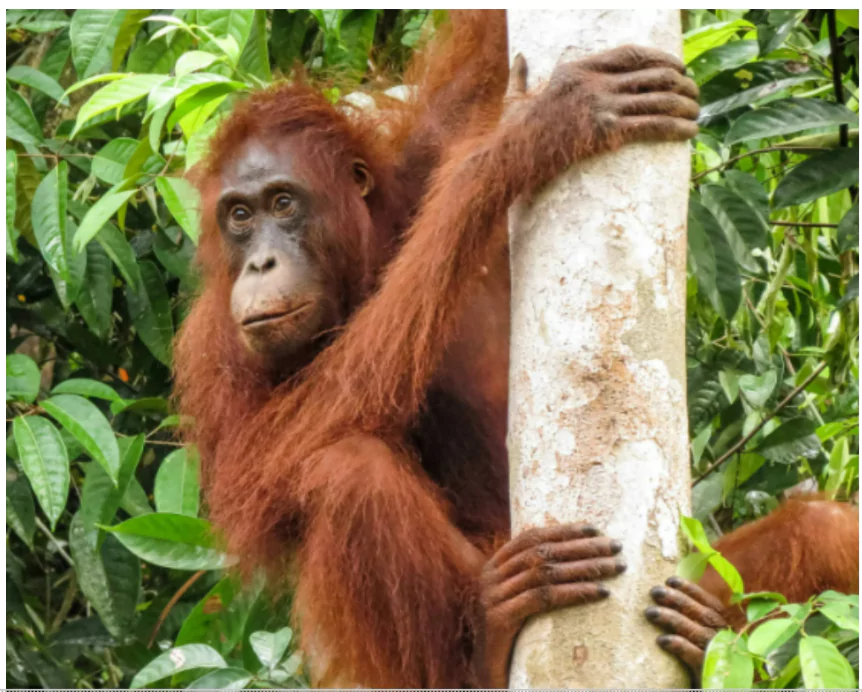Malaysia has introduced a revised conservation scheme where palm oil importing companies can adopt orangutans without them leaving the country.
About Orangutans

- Introduction: Orangutans in Malay and Indonesian, orangutan means “person of the forest”.
- Habitat: Found in peat swamp forests near sea level to mountainous forests, only in Malaysia and Indonesia.
- Characteristics:
- They have reddish fur, long arms, cheek pads, and opposable thumbs.
- They have human-like intelligence and have been known to employ herbal medicine to heal their wounds.
- They communicate and use sign language.
- There are three species of Orangutans-the Bornean, Sumatran, and Tapanuli.
- Conservation status: All three species are classified as ‘Critically Endangered’ under the IUCN Red List.
Enroll now for UPSC Online Classes
Need of Orangutan Diplomacy for Malaysia
- Economic Dependency on Palm Oil: Palm oil is a significant contributor to Malaysia’s economy, accounting for 5% of the country’s GDP in 2022. Orangutan diplomacy could safeguard this vital industry by improving Malaysia’s global image.
- Countering Negative Publicity: Malaysia has faced significant criticism for deforestation and its impact on wildlife, particularly orangutans. Orangutan diplomacy could help counteract this negative publicity by showcasing the country’s commitment to conservation.
- Strengthening Trade Relations: By using orangutan diplomacy, Malaysia aims to strengthen its trade relations with key palm oil importers, particularly in the face of the EU’s strict deforestation regulations.
- Soft Power Enhancement: Similar to China’s panda diplomacy, Malaysia can enhance its soft power by using orangutans as symbols of its cultural and environmental commitment, thereby gaining goodwill on the international stage.
Concerns regarding Orangutan Diplomacy
- Lack of Genuine Conservation Efforts: Critics argue that the policy may be more focused on public relations than on actual conservation, risking the well-being of orangutans.
- Potential for Exploitation: There is a concern that orangutans could be exploited as diplomatic tools, rather than being part of a sincere conservation initiative.
- Insufficient Habitat Protection: The policy does not adequately address the root cause of orangutan endangerment, which is habitat loss due to deforestation for palm oil plantations.
- Negative International Perception: The international community may perceive the policy as a superficial attempt to appease critics, rather than a genuine commitment to environmental sustainability, potentially leading to further criticism and reputational damage.
Check Out UPSC NCERT Textbooks From PW Store
About Panda Diplomacy
- Panda diplomacy refers to the practice of the Chinese government gifting or loaning giant pandas to other countries as a symbol of friendship, goodwill, or to strengthen diplomatic relations.
- Inspiration for Orangutan Diplomacy: Orangutan diplomacy is inspired by China’s successful panda diplomacy.
- The success of Panda Diplomacy is determined by three main elements
- Visual Appeal: Giant pandas have childlike characteristics that evoke empathy and a sense of protection from humans.
- Exclusivity: Pandas are found only in China, making them a unique and exclusive symbol of the country.
- Conservation Ties: The program is linked to high-profile conservation efforts, which have garnered international support and helped improve the panda’s conservation status.
- However, unlike China’s Panda Diplomacy, Orangutan Diplomacy lacks the robust conservation support and positive international perception that have made Panda Diplomacy successful.
|
![]() 23 Aug 2024
23 Aug 2024
